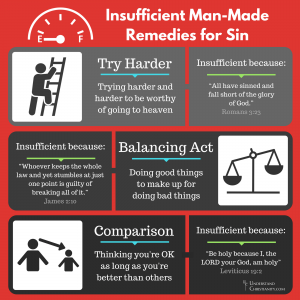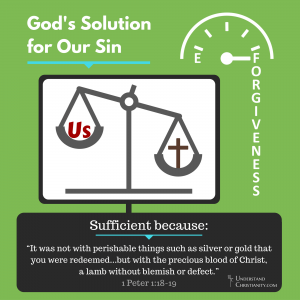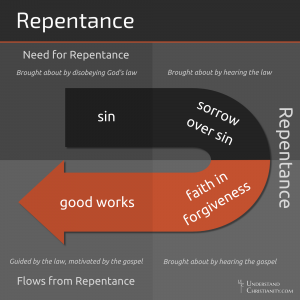The one teaching that sets Christianity apart from every other religion is the teaching of God’s grace, his undeserved love. We are sinners and don’t deserve God’s love, but he gives it to us anyway. We don’t need to do good things in order to earn eternal life, everlasting life with God. We don’t need to perform certain rituals or keep certain laws in order to get into heaven. Jesus already did that for us with his perfect life and his atoning sacrifice for our sins. God gives us everlasting life. God gives us heaven. And it’s all because of his grace.
Our Gracious God
God has been pouring out his grace upon us since the very beginning. First of all, he was caring for us humans even before he created Adam and Eve. The entire world was created for the good of mankind, the crown of his creation (Genesis 1:26-28). Secondly, after Adam and Eve sinned against God, he didn’t get rid of the world and start over. Instead he promised us a Savior to fix everything (Genesis 3:15). He also cares for each and every one of us before we come into the world, as King David proclaimed to God, “For you created my inmost being; you knit me together in my mother’s womb. I praise you because I am fearfully and wonderfully made” (Psalm 139:13-14).
The Need for God’s Grace
“God made him who had no sin to be sin for us, so that in him we might become the righteousness of God.”
2 Corinthians 5:21
Although God has wonderfully made and cared for each one of us, we are still plagued by our sinful natures passed down from Adam and Eve (Romans 5:12). Because of this, we can’t possibly live a life worthy enough of earning heaven and living with God forever. A person doesn’t get to heaven by doing good things or being viewed by the world as a “good person.” First of all, we sin way too much to be able to make up for all of the bad things we do. As Jesus teaches us, even our evil thoughts are sins (Matthew 5:21-22; 27-28). That means if God judged people by the good and bad things they did, there is not a human being on earth who could possibly do enough good things to balance out all of the bad things. Not only that, but because everyone is sinful, even the good things we do aren’t perfect. As the prophet Isaiah says, “All of us have become like one who is unclean, and all our righteous acts are like filthy rags” (Isaiah 64:6).
Secondly, even if we did more good things than bad things, we still wouldn’t get to heaven because God demands that we are to be perfect (Leviticus 19:2; Deuteronomy 27:26; Galatians 3:10). If we live a perfect life, a life of perfectly following God’s Law, we get go to heaven (Matthew 19:16-17; Luke 10:25-28). But it’s not possible for us to live a perfect life because we’re born sinful (Psalm 51:5; Matthew 19:25-26). And as the apostle John tells us, “If we claim to be without sin, we deceive ourselves and the truth is not in us” (1 John 1:8). James also says, “For whoever keeps the whole law and yet stumbles at just one point is guilty of breaking all of it” (James 2:10). We can’t possibly get to heaven through our own works because, quite simply, we aren’t perfect.
Declared “Not Guilty”
That’s why we need Jesus’ righteousness, which God graciously credits to us. Paul tells us, “God made him who had no sin to be sin for us, so that in him we might become the righteousness of God” (2 Corinthians 5:21). Jesus took our sins upon himself and gave us his righteousness, so God no longer sees the sins that made us guilty of breaking his law. Christians call this justification, a legal term for being declared “not guilty.” God looks at our record and sees no crimes, no sin, because Jesus put all of that on his record. Because of Jesus’ vicarious atonement, God looks at us and sees what Jesus did, not what we did.
“All have sinned and fall short of the glory of God, and all are justified freely by his grace through the redemption that came by Christ Jesus.”
Romans 3:23-24
This means we in no way can or need to help with our own justification. All of the work has already been completed. There’s no need for us to earn the “not guilty” verdict because Jesus has already earned it for us. If you’re declared “not guilty” by a judge, you don’t go back into the courtroom and try to convince him you’re innocent—you’ve already been declared innocent. In the same way, God has declared us innocent because of Jesus’ sacrifice, so there’s no point for us to do good works in order to gain God’s favor. Through Jesus we already have his undeserved favor, his grace, and as Paul says, “If by grace, then it is no longer by works; if it were, grace would no longer be grace” (Romans 11:6).
By Grace Alone, Not by Works
The apostle Paul had to battle ideas of work righteousness throughout his ministry. Many Jews of his time thought they still had to follow God’s written law in order to be considered believers. As Paul tried to teach them, by relying on their own works they were actually denying God’s grace. “You who are trying to be justified by law have been alienated from Christ; you have fallen away from grace” (Galatians 5:4). Likewise, by relying on our own works in any way we are telling God that we don’t trust what Jesus did for us. If we trust our own works for forgiveness then we don’t believe in God’s gift of justification through Christ.
Through God’s Gift of Faith
How do we receive this gracious gift of justification? We receive it through faith. Paul explains, “This righteousness from God comes through faith in Jesus Christ to all who believe. There is no difference, for all have sinned and fall short of the glory of God, and are justified freely by his grace” (Romans 3:22-24). All people have already been justified because of Jesus’ perfect life and death on the cross. God gives us the benefits of that justification through faith (Galatians 5:5). We receive the benefits of being declared innocent simply by believing what Jesus did for us.
“For it is by grace you have been saved, through faith—and this not from yourselves, it is the gift of God—not by works, so that no one can boast.”
Ephesians 2:8-9
This saving faith is given to us by God. We do not give ourselves faith. When we become believers, we do not decide to believe, or choose Jesus, or find Jesus on our own. We can’t do these things because we are spiritually “dead” (Ephesians 2:1-5), and “dead” means dead. Besides, even if we could give ourselves faith, that would be turning faith into a work. If coming to faith is something we have to do in order to be justified, then justification would no longer be by God’s grace. Thankfully, as Paul teaches us, faith is also a gift from God. “For it is by grace you have been saved, through faith—and this not from yourselves, it is the gift of God—not by works, so that no one can boast” (Ephesians 2:8-9). God not only justifies us through Jesus, but he also gives us the faith that receives the benefits of justification—forgiveness and eternal life.
Sadly, Many Reject the Gift
If our all-powerful God gives people faith, why isn’t everyone in the world a Christian? While we can’t bring ourselves to faith, sadly we can reject God and his message of forgiveness. God doesn’t force us to come to faith. He created us to serve him lovingly and willingly in response to his love and care. He wrote his law on our hearts and gave us each a conscience (Romans 2:15). He is trying to show us that we’ve sinned against him. He is trying to tell us we need a Savior. He is trying to give faith to each and every one of us. But our sinful natures make us want to reject God as our enemy (Romans 8:6-7; Colossians 1:21). By rejecting God we are telling him we don’t care what he is trying to tell us. By rejecting God we are telling him we don’t want faith in his forgiveness. And even when we stop rejecting God and his message, we’re still dead in our unbelief until God gives us faith and a new life. Thankfully though, we know he would never deny that opportunity, as he says, “As surely as I live, declares the Sovereign LORD, I take no pleasure in the death of the wicked, but rather that they turn from their ways and live” (Ezekiel 33:11).
A Life of Thanksgiving
Through God’s gift of faith we are able to see how much He loves us even though we don’t deserve it. “God demonstrates his own love for us in this: While we were still sinners, Christ died for us” (Romans 5:8). Now through faith in God’s grace we are able to return that love by doing good things for him and others (Matthew 25:34-40; John 15:1-8). Christians call this living a sanctified life, a God-pleasing life of love. Jesus himself tells us, “My command is this: Love each other as I have loved you” (John 15:12). Paul also says, “Therefore, as God’s chosen people, holy and dearly loved, clothe yourselves with compassion, kindness, humility, gentleness and patience. Bear with each other and forgive whatever grievances you may have against one another. Forgive as the Lord forgave you. And over all these virtues put on love, which binds them all together in perfect unity” (Colossians 3:12-14). We have been justified by God’s grace through faith, and now we get to show our thanks to him by loving him and each other the same way he has loved us.








